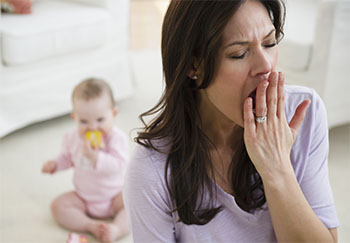Aaah, pregnancy. If you’re lucky, it’s the time when everyone asks how’re your doing, how you feel, and if can they open that door or carry that bag of groceries to your car. The time when your body’s changing, but you know it’s for that great prize at the end. The baby! So you endure the swelling, the sweating, the fatness and flatulence, the insomnia and perplexing mood swings because it will be over. One day. You know there’s an end in sight when you’re pregnant.
But there’s no official end date for the postpartum period. It could be two weeks or two years. There’s no due date for when you will stop feeling like your organs are falling out. For when, exactly, you will stop bleeding all day every day, or when you will stop emitting heat like a furnace while everyone else is shivering in their parkas.
The moods are equally perplexing but now nobody asks about you, they just ask about the baby and whether he or she or you are getting any sleep. That last question just put you over the edge, didn’t it? I talked to Carrie Sopata, MD, about the things that women endure in the postpartum period, when it will end and what they can do about it.
Postpartum Q&A
First question is a serious one: What’s the difference between the baby blues and postpartum depression (PPD)?
Baby blues are within the first two weeks after you give birth. Hormones are high in pregnancy and when the baby and placenta leave the body, the loss of those hormones can bring about menopause-like symptoms.

It’s also situational. There’s a new person to take care of. Maybe the spousal support is not there and maybe you had unrealistic expectations about sleep. Sleep deprivation is real, and it can make the baby blues worse and be a factor in postpartum depression.
Who’s at risk for PPD?
Women with a previous history of anxiety and depression are at risk, but anyone can develop it. We screen for it using the Edinburgh survey during pregnancy and immediately after delivery. We ask people that we’ve identified as high risk to see us two weeks after delivery in addition to the six-week postpartum visit. We refer patients to local counseling services, and if a patient thinks she needs medication to help with PPD, we can prescribe the appropriate medicine.
Onto the physical: Am I going to leak urine for the rest of my life?
No! It’s normal, if distressing, to leak some urine for the first few weeks. Kegel exercises can help you get muscle tone back, and you can start doing them soon after giving birth. Anything past six weeks is more serious, and certainly if you still have problems at 12 weeks postpartum, you should make an appointment with a urogynecologist. They’ll test your bladder pressure and do other tests that can determine why this problem persists.
Do you have post partum incontinence? We have a women’s center that specializes in pelvic floor disorders.
I think I have diastasis recti — can I do anything about that?
Diastasis recti (DR) are when your abdominal muscles separate and don’t come back together after pregnancy. There are tests you can do at home to see if you have it. Wearing a girdle can be helpful to retrain the muscles, and there are exercises you can do to strengthen the area without making DR worse. If it still persists after three months, plastic surgery might be the only way to treat it, but we’d only recommend that if you were finished having children.
Do I need birth control if I’m breastfeeding?
A lot of people ask if they can get pregnant while breastfeeding. You can. If you exclusively breast feed — this means no bottles, and before the introduction of solids — breastfeeding is 90 percent effective, but I don’t advise my patients to rely on breastfeeding alone if they want to avoid pregnancy.
You can take estrogen-free birth control pills that won’t affect breast milk. Other hormone-free options include copper-free IUDs — if you don’t plan on getting pregnant within the next year — and condoms, of course.
But where’s my libido?
There are some women who have high libido after childbirth but many don’t for the first several weeks. We recommend waiting until after the 6-week-visit to have sex to make sure everything’s healing. But if you have low libido, that’s normal too. Breastfeeding can suppress libido for physical reasons: Lactation suppresses estrogen production, and that can lead to vaginal dryness.
Whether you’re breastfeeding or not, sleep deprivation and feeling uncomfortable with your body factor into low libido, too.
So how do we get through it?
First, have realistic expectations about sleep. So many of my patients think that their infant is the only one that doesn’t sleep, but everyone’s in that boat. Having a baby is a huge adjustment! It affects every aspect of your life and health.
Support in the form of a spouse or family members or friends who can do laundry or bring over meals can take the pressure off and help you adjust.
Basically, lower your expectations during the postpartum period! With sleep, with getting things done, with getting your body back. Let yourself adjust and ask for help. If you need counseling resources or help with breastfeeding, UVA has those resources and we’re happy to refer our patients to the help they need.
